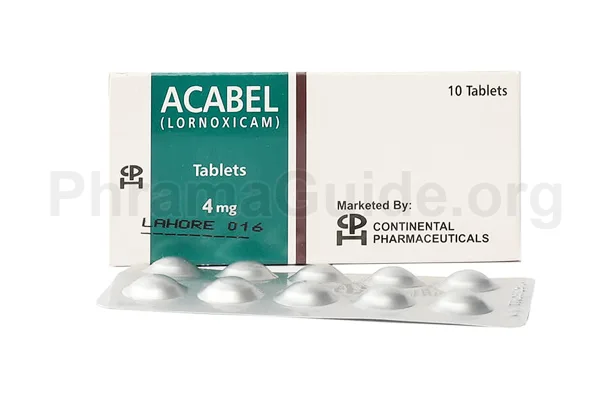Acabel is a nonsteroidal anti-inflammatory drug (NSAID) used to relieve pain and inflammation. Generally, Acabel is a safe drug but it can have side effects, and it can vary from person to person medical conditions. Here are some common and less common side effects can include.
Common Side Effects
- Gastrointestinal Issues: Nausea, vomiting, indigestion, abdominal pain, diarrhea, and in some cases, peptic ulcers or gastrointestinal bleeding.
- Dizziness or Headache: Some individuals may experience dizziness or headaches, especially when first starting Acabel.
- Skin Reactions: Rash, itching, or hives may occur. In rare cases, severe skin reactions like Stevens-Johnson syndrome can happen.
- Fluid Retention: Swelling in the legs or ankles due to fluid retention might occur.
- Allergic Reactions: Some people may experience allergic reactions like difficulty breathing, and swelling of the face, lips, tongue, or throat, which require immediate medical attention.
- Liver and Kidney Issues: In some cases, Acabel can affect liver or kidney function, resulting in abnormal liver or kidney tests.
- Cardiovascular Effects: Rarely, NSAIDs like Acabel can lead to increased blood pressure or heart palpitations.
- Central Nervous System Effects: This might include drowsiness, nervousness, or insomnia.
Less Common Side Effects
- Vision Changes: Blurred vision or other visual disturbances might occur in some individuals.
- Hematological Effects: Rarely, Acabel can affect blood cells, leading to conditions like anemia, thrombocytopenia (reduced platelets), or leukopenia (reduced white blood cells).
- Hepatic (Liver) Effects: In addition to the more common effects on liver function tests, there have been reports of hepatitis (inflammation of the liver) in rare cases.
- Renal (Kidney) Effects: Alongside changes in kidney function, renal failure or interstitial nephritis (inflammation of the kidney tissue) might occur in rare instances.
- Respiratory Issues: Some individuals may experience shortness of breath or other respiratory problems as a result of an allergic reaction or bronchospasm while taking Acabel.
- Psychiatric Effects: Although less common, mood changes, depression, or confusion have been reported in some cases associated with Acabel.
- Serious Skin Reactions: Severe skin reactions like toxic epidermal necrolysis (TEN) or drug reactions with eosinophilia and systemic symptoms (DRESS) are rare but possible.

What is Acabel?
Acabel is one of the leading brands of Lornoxicam, manufactured and marketed by Continental Pharmaceuticals (Pvt) Ltd, Pakistan.
Acabel : Available Formulations and Strengths
Presently, Acabel is available in Tablet and Injection Forms with the following strengths.
Acabel Tablets : 4mg and 8mg strengths.
Acabel Injection : 8mg/2ml strength.
What Are The Possible Drug Interactions of Acabel?
- Other NSAIDs or Aspirin: Concurrent use of multiple NSAIDs or combining Acabel with aspirin can increase the risk of gastrointestinal bleeding and ulceration.
- Anticoagulants (Warfarin, Heparin): Acabel may enhance the effects of anticoagulants, leading to an increased risk of bleeding. Close monitoring of blood clotting parameters is necessary when these drugs are used together.
- Corticosteroids: The combination of Acabel with corticosteroids can elevate the risk of gastrointestinal ulceration or bleeding.
- Selective Serotonin Reuptake Inhibitors (SSRIs) and Serotonin-Norepinephrine Reuptake Inhibitors (SNRIs): Concurrent use with these antidepressants can increase the risk of bleeding due to their effects on platelet function.
- ACE Inhibitors and Angiotensin II Receptor Blockers (ARBs): These drugs, used for blood pressure management, may reduce the effects of Acabel on blood pressure.
- Diuretics: The use of diuretics along with Acabel can potentially reduce its effects on blood pressure control.
- Methotrexate: Acabel might increase the blood levels of methotrexate, leading to potential toxicity. Close monitoring of methotrexate levels and its side effects is crucial.
- Cyclosporine and Tacrolimus: There’s a risk of kidney damage when Acabel is used concurrently with these immunosuppressants.
- Lithium: Acabel may increase lithium levels, potentially leading to lithium toxicity. Regular monitoring of lithium levels is recommended when used together.
- Quinolone Antibiotics: Concurrent use with Acabel may increase the risk of seizures.

Leave A Comment